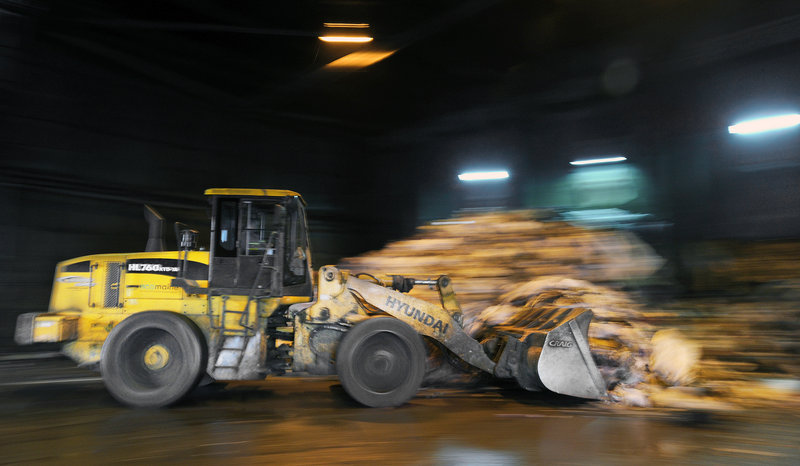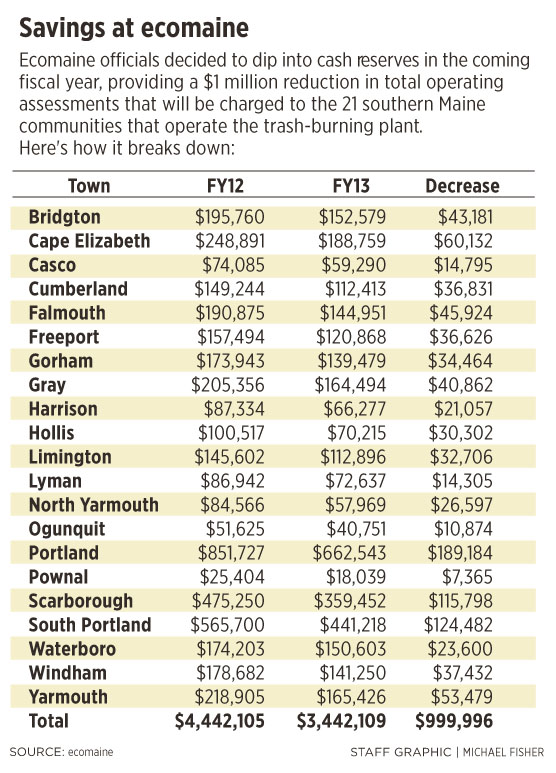PORTLAND — Ecomaine will make its final debt payment two years early on Aug. 1, a sign of sustained financial health for the once-troubled trash-burning and recycling plant that is owned and operated by 21 southern Maine communities.
The trash-to-energy plant will be debt-free for the first time since it opened in 1988 — quite a feat for an agency that was $70 million in debt before a major reorganization in 2004. It even changed its name from Regional Waste Systems to reflect the new direction.
Ecomaine is doing so well, agency officials said Monday, that its board of directors decided to dip into $23 million in cash reserves and reduce total annual assessments paid by owner communities in the coming year by a total of nearly $1 million, according to agency officials.
“It’s a stark contrast from when it was RWS,” said Mike Bobinsky, Portland’s public services director and chairman of ecomaine’s board of directors. “We’ve completely changed the way we operate and become an example of regional government at its best.”
Ecomaine’s success is being featured this week during the annual North American Waste-to-Energy Conference at Holiday Inn by the Bay. Many of the 450 participants are expected to tour the plant, its recycling facility and its ash landfill on Wednesday.
Ecomaine’s board took action last Thursday, approving a $24 million operating budget for fiscal 2013, which starts July 1. The board also passed a resolution to pay off the plant, which cost $90 million to build and was refinanced a few times to pay for expansions and environmental upgrades.
In the coming year, total annual assessments paid by owner communities to cover operations will drop $999,996, from $4.4 million to $3.4 million.
Bridgton will save $43,181; Cape Elizabeth, $60,132; Casco, $14,795; Cumberland, $36,831; Falmouth, $45,924; Freeport, $36,626; Gorham, $34,464; Gray, $40,862; Harrison, $21,057; Hollis, $30,302; Limington, $32,706; Lyman, $14,305; North Yarmouth, $26,597; Ogunquit, $10,874; Portland, $189,184; Pownal, $7,365; Scarborough, $115,798; South Portland, $124,482; Waterboro, $23,600; Windham, $37,432; and Yarmouth, $53,479.
The savings will help many cash-strapped owner communities, including South Portland, where it will offset a projected $125,000 increase in municipal employees’ health benefits in fiscal 2013.
“The savings are definitely welcome in South Portland,” said City Manager Jim Gailey, who heads ecomaine’s finance committee.
The $88-per-ton tipping fee that owner communities pay to burn trash at the massive plant on Blueberry Road is the same as it was in 2004, when they faced spiraling trash-disposal costs and expanding debt.
Under the debt-payoff plan, ecomaine will make a $4 million payment on July 1, followed by a final $585,000 payment on Aug. 1. The final fee combines a $285,000 payment that’s due July 1, 2013, and the balance due July 1, 2014.
Paying early will save the owner communities $10,000 in interest and fees.
The early payment is possible, in part, because ecomaine officials refinanced the plant’s debt in 2006 at a lower rate without adding years to the payment plan.
“(Ecomaine board members) wanted to show that they weren’t going to extend the debt forever,” said Kevin Roche, ecomaine’s general manager since 2004. “It was part of their effort to increase transparency and build trust with owner and member communities.” Ecomaine also dipped into cash reserves this year, reducing owner assessments by a total of $237,000 for fiscal 2012, when tipping fees are expected to exceed a $12.9 million projection by $400,000; and recycling is expected to bring in $500,000 more than a projected $3 million, according to budget documents.
The board limited assessment relief to $1 million in fiscal 2013 because revenue sources remain uncertain, including the municipal waste stream, which has dropped 28 percent in the past decade, Roche said.
Ecomaine is expected to generate about $3.1 million worth of electricity in fiscal 2013, based on a projected rate of $39 per megawatt hour. The going rate for electricity dropped from $67 per megawatt hour in fiscal 2011 to $44 per megawatt hour in fiscal 2012.
Gailey and Bobinsky credited Roche for hiring good people, improving plant efficiency, increasing recycling and negotiating competitive rates for commercial trash burned at the plant.
They also said he has improved relationships with owner communities, associate member communities (Baldwin, Hiram, Naples, Parsonsfield, Porter, Saco and Standish) and contract member communities (Andover, Cornish, Harpswell, Jay, Livermore Falls, Manchester, Monmouth, North Haven, Old Orchard Beach, Poland, Readfield, Sanford, Wayne and Newington, N.H.).
“He really turned around ecomaine,” Gailey said.
Looking ahead, ecomaine is preparing for major expenses in the future, setting aside as much as $850,000 each year to replace aging equipment, make environmental upgrades and close its ash landfill in Scarborough in 20 to 25 years, said Art Birt, ecomaine’s finance director.
Closing the landfill is expected to cost about $22 million initially, and more to monitor its environmental impact for years afterward.
Staff Writer Kelley Bouchard can be contacted at 791-6328 or at: kbouchard@pressherald.com
Copy the Story Link
Send questions/comments to the editors.




Success. Please wait for the page to reload. If the page does not reload within 5 seconds, please refresh the page.
Enter your email and password to access comments.
Hi, to comment on stories you must . This profile is in addition to your subscription and website login.
Already have a commenting profile? .
Invalid username/password.
Please check your email to confirm and complete your registration.
Only subscribers are eligible to post comments. Please subscribe or login first for digital access. Here’s why.
Use the form below to reset your password. When you've submitted your account email, we will send an email with a reset code.